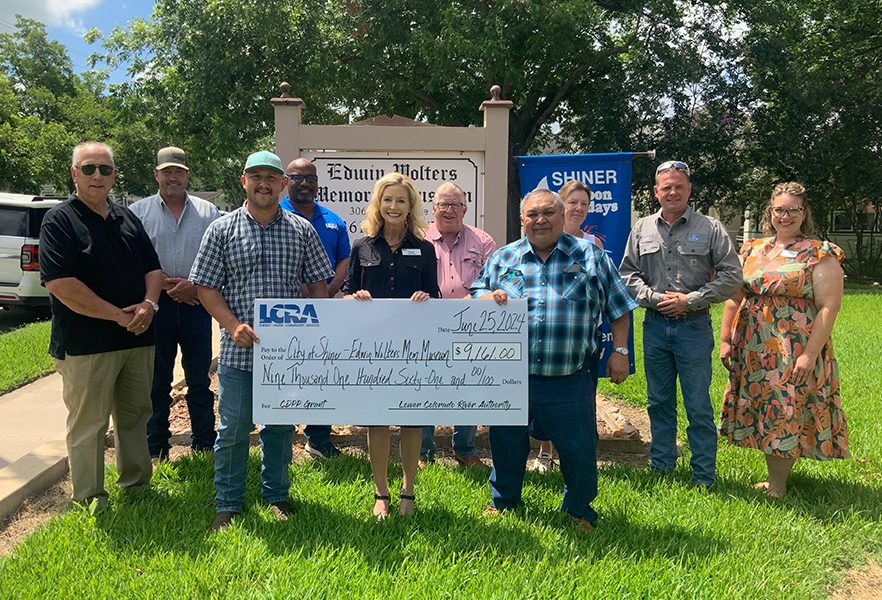LCRA awards $9,161 grant to Edwin Wolters Memorial Museum
New mini-split heating, ventilating and air conditioning units will help preserve historical documents, weapons and other relics
JUNE 25, 2024

SHINER, Texas – The City of Shiner’s Edwin Wolters Memorial Museum soon will install two new mini-split heating, ventilating and air conditioning units to better preserve local history, thanks to a $9,161 grant from the Lower Colorado River Authority.
The LCRA Community Development Partnership Program grant, along with $2,291 in matching funds, will allow the museum to purchase and install the units in its Ol’ Main building, as well as upgrade the building’s wiring with about 150 feet of new electrical conduit.
The Ol’ Main Building was built in 1915 by H. Hollman, who later willed the home to his daughter, Hennie, and her husband, Edwin Wolters. Museum staff members currently turn on window units at the start of each day to cool the two-story building. Frank Wagner, the museum’s assistant curator, said the inconsistent climate is affecting the preservation of the museum’s antiquities.
“We have a lot of old photos and paper documents on display in the museum, and the constantly changing temperatures with different seasons are harming them – some are starting to fade,” he said. “We also have a weapons room, and the antique guns can build up rust from fluctuating humidity.”
Wagner said having year-round climate control also will help save money, because the window units use a lot of electricity trying to cool the building’s large main room.
“Because the museum doesn’t require any admission fee for visiting the museum, we couldn’t have done this without this grant,” Wagner said. “We really needed these air-conditioning units, and LCRA and the city really came through for us.”
Wagner said having an air-conditioned museum to visit on warm days will benefit local residents, as well as tourists, and that the museum staff promotes local businesses by providing recommendations to visitors for places to eat, shop and hear live music.
“Every town is struggling with inflation, and we are pleased to give people a free place to visit that is full of history and significance to our community,” he said. “When Edwin Wolters gave his house to the City of Shiner in 1963 to use as a museum, he had two stipulations: Be open as much as possible and never charge admission.”
The museum and its tours provide a cross section of 18th, 19th and 20th century everyday life in South Central Texas with a special focus on the legacy of the Czech and German immigrants and African Americans who settled in the area. The museum’s main grounds include a shed with farm tools and equipment, a general store, the old city jail that dates back to 1890, the George Herder Home that was built in 1882, the Herder cistern house that is a repository for rotary club displays, and the Ol’ Main Building with its collection of historical items.
The community grant is one of 44 grants awarded recently through LCRA’s Community Development Partnership Program, which helps volunteer fire departments, local governments, emergency responders and nonprofit organizations fund capital improvement projects in LCRA’s wholesale electric, water and transmission service areas. The program is part of LCRA’s effort to give back to the communities it serves. The City of Shiner is one of LCRA’s wholesale electric customers and is a partner in the grant program.
Applications for the next round of grants will be accepted in July. More information is available at lcra.org/cdpp.
About LCRA
The Lower Colorado River Authority serves customers and communities throughout Texas by managing the lower Colorado River; generating and transmitting electric power; providing a clean, reliable water supply; and offering outdoor adventures at more than 40 parks along the Colorado River from the Texas Hill Country to the Gulf Coast. LCRA and its employees are committed to fulfilling our mission to enhance the quality of life of the Texans we serve through water stewardship, energy and community service. LCRA was created by the Texas Legislature in 1934 and receives no state appropriations.


Social Media